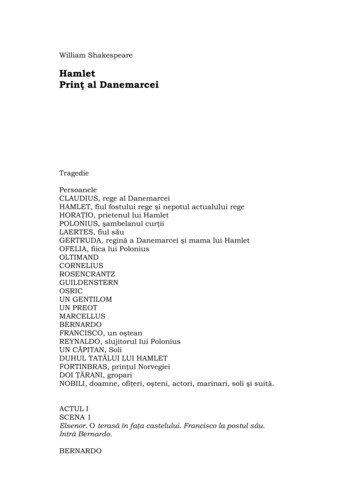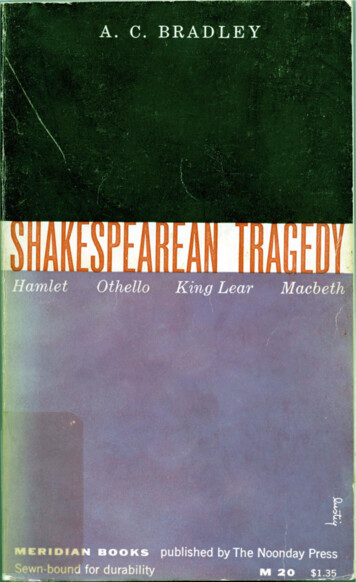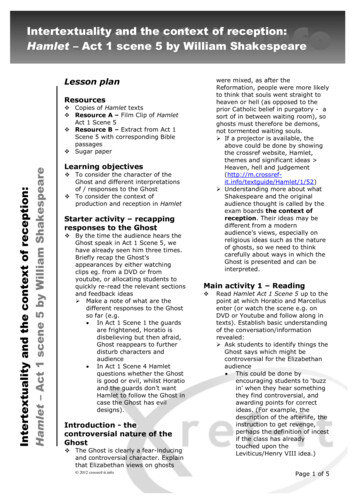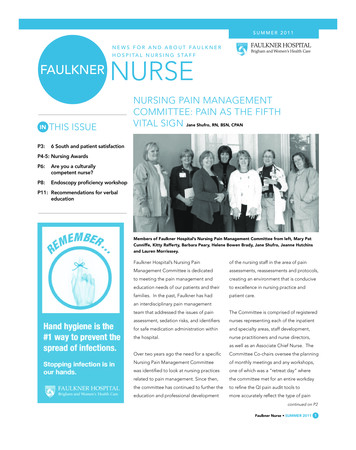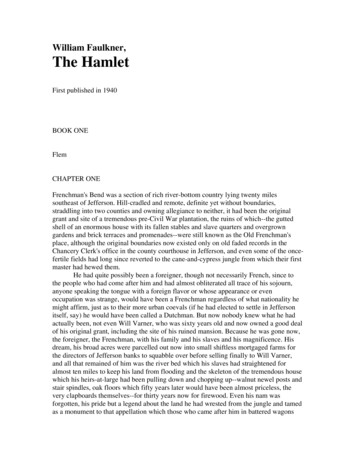
Transcription
William Faulkner,The HamletFirst published in 1940BOOK ONEFlemCHAPTER ONEFrenchman's Bend was a section of rich river-bottom country lying twenty milessoutheast of Jefferson. Hill-cradled and remote, definite yet without boundaries,straddling into two counties and owning allegiance to neither, it had been the originalgrant and site of a tremendous pre-Civil War plantation, the ruins of which--the guttedshell of an enormous house with its fallen stables and slave quarters and overgrowngardens and brick terraces and promenades--were still known as the Old Frenchman'splace, although the original boundaries now existed only on old faded records in theChancery Clerk's office in the county courthouse in Jefferson, and even some of the oncefertile fields had long since reverted to the cane-and-cypress jungle from which their firstmaster had hewed them.He had quite possibly been a foreigner, though not necessarily French, since tothe people who had come after him and had almost obliterated all trace of his sojourn,anyone speaking the tongue with a foreign flavor or whose appearance or evenoccupation was strange, would have been a Frenchman regardless of what nationality hemight affirm, just as to their more urban coevals (if he had elected to settle in Jeffersonitself, say) he would have been called a Dutchman. But now nobody knew what he hadactually been, not even Will Varner, who was sixty years old and now owned a good dealof his original grant, including the site of his ruined mansion. Because he was gone now,the foreigner, the Frenchman, with his family and his slaves and his magnificence. Hisdream, his broad acres were parcelled out now into small shiftless mortgaged farms forthe directors of Jefferson banks to squabble over before selling finally to Will Varner,and all that remained of him was the river bed which his slaves had straightened foralmost ten miles to keep his land from flooding and the skeleton of the tremendous housewhich his heirs-at-large had been pulling down and chopping up--walnut newel posts andstair spindles, oak floors which fifty years later would have been almost priceless, thevery clapboards themselves--for thirty years now for firewood. Even his nam wasforgotten, his pride but a legend about the land he had wrested from the jungle and tamedas a monument to that appellation which those who came after him in battered wagons
and on muleback and even on foot, with flintlock rifles and dogs and children and homemade whiskey stills and Protestant psalm-books, could not even read, let alonepronounce, and which now had nothing to do with any once-living man at all--his dreamand his pride now dust with the lost dust of his anonymous bones, his legend but thestubborn tale of the money he buried somewhere about the place when Grant overran thecountry on his way to Vicksburg.The people who inherited from him came from the northeast, through theTennessee mountains by stages marked by the bearing and raising of a generation ofchildren. They came from the Atlantic seaboard and before that, from England and theScottish and Welsh Marches, as some of the names would indicate--Turpin and Haleyand Whittington, McCallum and Murray and Leonard and Littlejohn, and other nameslike Riddup and Armstid and Doshey which could have come from nowhere sincecertainly no man would deliberately select one of them for his own. They brought noslaves and no Phyfe and Chippendale highboys; indeed, what they did bring most of themcould (and did) carry in their hands. They took up land and built one- and two-roomcabins and never painted them, and married one another and produced children and addedother rooms one by one to the original cabins and did not paint them either, but that wasall. Their descendants still planted cotton in the bottom land and corn along the edge ofthe hills and in the secret coves in the hills made whiskey of the corn and sold what theydid not drink. Federal officers went into the country and vanished. Some garment whichthe missing man had worn might be seen--a felt hat, a broadcloth coat, a pair of city shoesor even his pistol--on a child or an old man or woman. County officers did not botherthem at all save in the heel of election years. They supported their own churches andschools, they married and committed infrequent adulteries and more frequent homicidesamong themselves and were their own courts judges and executioners. They wereProtestants and Democrats and prolific; there was not one Negro landowner in the entiresection. Strange Negroes would absolutely refuse to pass through it after dark.Will Varner, the present owner of the Old Frenchman place, was the chief man ofthe country. He was the largest landholder and beat supervisor in one county and Justiceof the Peace in the next and election commissioner in both, and hence the fountainhead ifnot of law at least of advice and suggestion to a countryside which would have repudiatedthe term constituency if they had ever heard it, which came to him, not in the attitude ofWhat must I do but What do you think you think you would like jor me to do if youwas able to make me do it. He was a farmer, a usurer, a veterinarian; Judge Benbow ofJefferson once said of him that a milder-mannered man never bled a mule or stuffed aballot box. He owned most of the good land in the country and held mortgages on most ofthe rest. He owned the store and the cotton gin and the combined grist mill andblacksmith shop in the village proper and it was considered, to put it mildly, bad luck fora man of the neighborhood to do his trading or gin his cotton or grind his meal or shoe hisstock anywhere else. He was thin as a fence rail and almost as long, with reddish-grayhair and moustaches and little hard bright innocently blue eyes; he looked like aMethodist Sunday School superintendent who on week days conducted a railroadpassenger train or vice versa and who owned the church or perhaps the railroad orperhaps both. He was shrewd secret and merry, of a Rabelaisian turn of mind and veryprobably still sexually lusty (he had fathered sixteen children to his wife, though only twoof them remained at home, the others scattered, married and buried, from El Paso to the
Alabama line) as the spring of his hair which even at sixty was still more red than gray,would indicate. He was at once active and lazy; he did nothing at all (his son managed allthe family business) and spent all his time at it, out of the house and gone before the sonhad come down to breakfast even, nobody knew where save that he and the old fat whitehorse which he rode might be seen anywhere within the surrounding ten miles at anytime, and at least once every month during the sprin and summer and early fall, the oldwhite horse tethered to an adjacent fence post, he would be seen by someone sitting in ahome-made chair on the jungle-choked lawn of the Old Frenchman's homesite. Hisblacksmith had made the chair for him by sawing an empty flour barrel half through themiddle and trimming out the sides and nailing a seat into it, and Varner would sit therechewing his tobacco or smoking his cob pipe, with a brusque word for passers cheerfulenough but inviting no company, against his background of fallen baronial splendor. Thepeople (those who saw him sitting there and those who were told about it) all believedthat he sat there planning his next mortgage foreclosure in private, since it was only to anitinerant sewing-machine agent named Ratliff--a man less than half his age--that he evergave a reason: "I like to sit here. I'm trying to find out what it must have felt like to be thefool that would need all this"--he did not move, he did not so much as indicate with hishead the rise of old brick and tangled walks topped by the columned ruin behind him-"just to eat and sleep in." Then he said--and he gave Ratliff no further clue to whichmight have been the truth--"For a while it looked like I was going to get shut of it, get itcleared up. But by God folks have got so lazy they wont even climb a ladder to pull offthe rest of the boards. It looks like they will go into the woods and even chop up a treebefore they will reach above eyelevel for a scantling of pine kindling. But after all, Ireckon I'll just keep what there is left of it, just to remind me of my one mistake. This isthe only thing I ever bought in my life I couldn't sell to nobody."The son, Jody, was about thirty, a prime bulging man, slightly thyroidic, who wasnot only unmarried but who emanated a quality of invincible and inviolable bachelordomas some people are said to breathe out the odor of sanctity or spirituality. He was a bigman, already promising a considerable belly in ten or twelve years, though as yet he stillmanaged to postulate something of the trig and unattached cavalier. He wore, winter andsummer (save that in the warm season he dispensed with the coat) and Sundays and weekdays, a glazed collarless white shirt fastened at the neck with a heavy gold collar-buttonbeneath a suit of good blac broadcloth. He put on the suit the day it arrived from theJefferson tailor and wore it every day and in all weathers thereafter until he sold it to oneof the family's Negro retainers, so that on almost any Sunday night one whole one orsome part of one of his old suits could be met--and promptly recognised--walking thesummer roads, and replaced it with the new succeeding one. In contrast to the unvaryingoveralls of the men he lived among he had an air not funereal exactly but ceremonial-this because of that quality of invincible bachelorhood which he possessed: so that,looking at him you saw, beyond the flabbiness and the obscuring bulk, the perennial andimmortal Best Man, the apotheosis of the masculine Singular, just as you discern beneaththe dropsical tissue of the '09 halfback the lean hard ghost which once carried a ball. Hewas the ninth of his parents' sixteen children. He managed the store of which his fatherwas still titular owner and in which they dealt mostly in foreclosed mortgages, and thegin, and oversaw the scattered farm holdings which his father at first and later the two ofthem together had been acquiring during the last forty years.
One afternoon he was in the store, cutting lengths of plow-line from a spool ofnew cotton rope and looping them in neat seamanlike bights onto a row of nails in thewall, when at a sound behind him he turned and saw, silhouetted by the open door, a mansmaller than common, in a wide hat and a frock coat too large for him, standing with acurious planted stiffness. "You Varner?" the man said, in a voice not harsh exactly, or notdeliberately harsh so much as rusty from infrequent use."I'm one Varner," Jody said, in his bland hard quite pleasant voice. "What can Ido for you?""My name is Snopes. I heard you got a farm to rent.""That so?" Varner said, already moving so as to bring the other's face into thelight. "Just where did you hear that?" Because the farm was a new one, which he and hisfather had acquired through a foreclosure sale not a week ago, and the man was acomplete stranger. He had never even heard the name before.The other did not answer. Now Varner could see his face--a pair of eyes of a coldopaque gray between shaggy graying irascible brows and a short scrabble of iron-graybeard as tight and knotted as a sheep's coat. "Where you been farming?" Varner said."West." He did not speak shortly. He merely pronounced the one word with acomplete inflectionless finality, as if he had closed a door behind himself."You mean Texas?""No.""I see. Just west of here. How much family you got?""Six." Now there was no perceptible pause, nor was there any hurrying on into thenext word. But there was something. Varner sensed it even before the lifeless voiceseemed deliberately to compound the inconsistency: "Boy and two girls. Wife and hersister.""That's just five.""Myself," the dead voice said."A man dont usually count himself among his own field hands," Varner said. "Is itfive or is it seven?""I can put six hands into the field."Now Varner's voice did not change either, still pleasant, still hard: "I dontknow as I will take on a tenant this year. It's already almost first of May. I figure I mightwork it myself, with day labor. If I work it at all this year.""I'll work that way," the other said. Varner looked at him."Little anxious to get settled, aint you?" The other said nothing. Varner could nottell whether the man was looking at him or not. "What rent were you aiming to pay?""What do you rent for?""Third and fourth," Varner said. "Furnish out of the store here. No cash.""I see. Furnish in six-bit dollars.""That's right," Varner said pleasantly. Now he could not tell if the man werelooking at anything at all or not."I'll take it," he said.Standing on the gallery of the store, above the half dozen overalled men sitting orsquatting about it with pocket knives and slivers of wood, Varner watched his caller limpstiffl across the porch, looking neither right nor left, and descend and from among thetethered teams and saddled animals below the gallery choose a gaunt saddleless mule in a
worn plow bridle with rope reins and lead it to the steps and mount awkwardly and stifflyand ride away, still without once looking to either side. "To hear that ere foot, you'd thinkhe weighed two hundred pounds," one of them said. "Who's he, Jody?"Varner sucked his teeth and spat into the road. "Name's Snopes," he said."Snopes?" a second man said. "Sho now. So that's him." Now not only Varner butall the others looked at the speaker--a gaunt man in absolutely clean though faded andpatched overalls and even freshly shaven, with a gentle, almost sad face until youunravelled what were actually two separate expressions--a temporary one of static peaceand quiet overlaying a constant one of definite even though faint harried-ness, and asensitive mouth which had a quality of adolescent freshness and bloom until you realisedthat this could just as well be the result of a lifelong abstinence from tobacco--the face ofthe breathing archetype and protagonist of all men who marry young and father onlydaughters and are themselves but the eldest daughter of their own wives. His name wasToll. "He's the fellow that wintered his family in a old cottonhouse on Ike McCaslin'splace. The one that was mixed up in that burnt barn of a fellow named Harris over inGren-ier County two years ago.""Huh?" Varner said. "What's that? Burnt barn?""I never said he done it," Tull said. "I just said he was kind of involved in it after afashion you might say.""How much involved in it?""Harris had him arrested into court.""I see," Varner said. "Just a pure case of mistaken identity. He just hired it done.""It wasn't proved," Tull said. "Leastways, if Harris ever found any proofafterward, it was too late then. Because he had done left the country. Then he turned up atMcCaslin's last September. Him and his family worked by the day, gathering forMcCaslin, and McCaslin let them winter in a old cottonhouse he wasn't using. That's all Iknow. I aint repeating nothing.""I wouldn't," Varner said. "A man dont want to get the name of a idle gossip." Hestood above them with his broad bland face, in his dingy formal black-and-white--theglazed soiled white shin and the bagging and uncared-for trousers--a costume at onceceremonial and negligee. He sucked his teeth briefly and noisily. "Well well well," hesaid. "A barn burner. Well well well."That night he told his father about it at the supper table. With the exception of therambling half-log half-sawn plank edifice known as Littlejohn's hotel, Will Varner's wasthe only house in the country with more than one storey. They had a cook too, not onlythe only Negro servant but the only servant of any sort in the whole district. They had hadher for years yet Mrs Varner still said and apparently believed that she could not betrusted even to boil water unsupervised. He told it that evening while his mother, a plumpcheery bustling woman who had borne sixteen children and already outlived five of themand who still won prizes for preserved fruits and vegetables at the annual County Fair,bustled back and forth between dining room and kitchen, and his sister, a soft ample girlwith definite breasts even at thirteen and eyes like cloudy hothouse grapes and a fulldamp mouth always slightly open, sat at her place in a kind of sullen bemusement of rifeyoung female flesh, apparently not even having to make any effort not to listen."You already contracted with him?" Will Varner said.
"I hadn't aimed to at all till Vernon Tull told me what he did. Now I figure I'll takethe paper up there tomorrow and let him sign.""Then you can point out to him which house to burn too. Or are you going toleave that to him?""Sho," Jody said. "We'll discuss that too." Then he said--and now all levity wasgone from his voice, all poste and riposte of humor's light whimsy, tierce quarto andprime: "All I got to do is find out for sho about that barn. But then it will be the samething, whether he actually did it or not. All hell need will be to find out all of a sudden atgathering time that I think he did it. Listen. Take a case like this." He leaned forwardnow, over the table, bulging, protuberant, intense. The mother had bustled out, to thekitchen, where her brisk voice could be heard scolding cheerfully at the Negro cook. Thedaughter was not listening at all. "Here's a piece of land that the folks that own it hadn'tactually figured on getting nothing out of this late in the season. And here comes a manand rents it on shares that the last place he rented on a barn got burnt up. It dont matterwhether he actually burnt that barn or not, though it will simplify matters if I can find outfor sho he did. The main thing is, it burnt while he was there and the evidence was suchthat he felt called on to leave the country. So here he comes and rents this land we hadn'tfigured on nothing out of this year nohow and we furnish him outen the store all regularand proper. And he makes his crop and the landlord sells it all regular and has the cashwaiting and the fellow comes in to get his share and the landlord says, 'What's this I heardabout you and that barn?' That's all. 'What's this I just heard about you and that barn?' "They stared at one another--the slightly protuberant opaque eyes and the little hard blueones. "What will he say? What can he say except 'All right. What do you aim to do?'""You'll lose his furnish bill at the store.""Sho. There aint no way of getting around that. But after all, a man that's makingyou a crop free gratis for nothing, at least you can afford to feed him while he's doing it.-Wait," he said. "Hell fire, we wont even need to do that; I'll just let him find a couple ofrotten shingles with a match laid across them on his doorstep the morning after hefinishes laying-by and he'll know it's all up then and aint nothing left for him but to moveon. That'll cut two months off the furnish bill and all we'll be out is hiring his cropgathered." They stared at one another. To one of them it was already done, accomplished:he could actually see it; when he spoke it was out of a time still six months in the futureyet: "Hell fire, he'll have to! He cant fight it! He dont dare!""Hmph," Will said. From the pocket of his unbuttoned vest he took a stained cobpipe and began to fill it. "You better stay clear of them folks.""Sho now," Jody said. He took a toothpick from the china receptacle on the tableand sat back. "Burning barns aint right. And a man that's got habits that way will justhave to suffer the disadvantages of them."He did not go the next day nor the one after that either. But early in the afternoonof the third day, his roan saddle horse hitched and waiting at one of the gallery posts, hesat at the roll-top desk in the rear of the store, hunched, the black hat on the back of hishead and one broad black-haired hand motionless and heavy as a ham of meat on thepaper and the pen in the other tracing the words of the contract in his heavy deliberatesprawling script. An hour after that and five miles from the village, the contract blottedand folded neatly into his hip pocket, he was sitting the horse beside a halted buckboardin the road. It was battered with rough usage and caked with last winter's dried mud, it
was drawn by a pair of shaggy ponies as wild and active-looking as mountain goats andalmost as small. To the rear of it was attached a sheet-iron box the size and shape of adog kennel and painted to resemble a house, in each painted window of which a paintedwoman's face simpered above a painted sewing machine, and Varner sat his horse andglared in shocked and outraged consternation at its occupant, who had just saidpleasantly, "Well, Jody, I hear you got a new tenant.""Hell fire!" Varner cried. "Do you mean he set fire to another one? even after theycaught him, he set fire to another one?""Well," the man in the buckboard said, "I dont know as I would go on record assaying he set ere a one of them afire. I would put it that they both taken fire while he wasmore or less associated with them. You might say that fire seems to follow him around,like dogs follows some folks." He spoke in a pleasant, lazy, equable voice which you didnot discern at once to be even more shrewd than humorous. This was Ratliff, the sewingmachine agent. He lived in Jefferson and he travelled the better part of four counties withhis sturdy team and the painted dog kennel into which an actual machine neatly fitted. Onsuccessive days and two counties apart the splashed and battered buckboard and thestrong mismatched team might be seen tethered in the nearest shade and Ratliffs blandaffable ready face and his neat tieless blue shirt one of the squatting group at a crossroadsstore, or--and still squatting and still doing the talking apparently though actually doing agood deal more listening than anybody believed until afterward--among the womensurrounded by laden clotheslines and tubs and blackened wash pots beside springs andwells, or decorous in a splint chair on cabin galleries, pleasant, affable, courteous,anecdotal and impenetrable. He sold perhaps three machines a year, the rest of the timetrading in land and livestock and second-hand farming tools and musical instruments oranything else which the owner did not want badly enough, retailing from house to housethe news of his four counties with the ubiquity of a newspaper and carrying personalmessages from mouth to mouth about weddings and funerals and the preserving ofvegetables and fruit with the reliability of a postal service. He never forgot a name and heknew everyone, man mule and dog, within fifty miles. "Just say it was following alongbehind the wagon when Snopes druv up to the house De Spain had give him, with thefurniture piled into the wagon bed like he had druv up to the house they had been livingin at Harris's or wherever it was and said 'Get in here' and the cookstove and beds andchairs come out and got in by their selves. Careless and yet good too, tight, like they wasused to moving and not having no big help at it. And Ab and that big one, F1em they callhim--there was another one too, a little one; I remember seeing him once somewhere. Hewasn't with them. Leastways he aint now. Maybe they forgot to tell him when to getouten the barn.--setting on the seat and them two hulking gals in the two chairs in thewagon bed and Miz Snopes and her sister, the widow, setting on the stuff in back likenobody cared much whether they come along or not either, including the furniture. Andthe wagon stops in front of the house and Ab looks at it and says, 'Likely it aint fitten forhawgs.' "Sitting the horse, Varner glared down at RatlifE in protuberant and speechlesshorror. "All right," Ratliff said. "Soon as the wagon stopped Miz Snopes and the widowgot out and commenced to unload. Them two gals aint moved yet, just setting there inthem two chairs, in their Sunday clothes, chewing sweet gum, till Ab turned round andcussed them outen the wagon to where Miz Snopes and the widow was wrastling with the
stove. He druv them out like a pair of heifers just a little too valuable to hit hard with astick, and then him and Flem set there and watched them two strapping gals take a woreout broom and a lantern outen the wagon and stand there again till Ab leant out andsnicked the nigh one across the stern with the end of the reins. 'And then you come backand help your maw with that stove,' he hollers after them. Then him and Flem got outenthe wagon and went up to call on De Spain.""To the barn?" Varner cried. "You mean they went right straight and------""No no. That was later. The barn come later. Likely they never knowed just whereit was yet. The barn burnt all regular and in due course; you'll have to say that for him.This here was just a call, just pure friendship, because Snopes knowed where his fieldswas and all he had to do was to start scratching them, and it already the middle of May.Just like now," he added in a tone of absolutely creamlike innocence. "But then I hear tellhe always makes his rent contracts later than most." But he was not laughing. The shrewdbrown face was as bland and smooth as ever beneath the shrewd impenetrable eyes."Well?" Varner said violently. "If he sets his fires like you tell about it, I reckon Idont need to worry until Christmas. Get on with it. What does he have to do before hestarts lighting matches? Maybe I can recognise at least some of the symptoms in time.""All right," Ratliff said. "So they went up the road, leaving Miz Snopes and thewidow wrastling at the cookstove and them two gals standing there now holding a wirerat-trap and a chamber pot, and went up to Major de Spain's and walked up the privateroad where that pile of fresh horse manure was and the nigger said Ab stepped in it ondeliberate purpose. Maybe the nigger was watching them through the front window.Anyway Ab tracked it right across the front porch and knocked and when the nigger toldhim to wipe it offen his feet, Ab shoved right past the nigger and the nigger said he wipedthe rest of it off right on that ere hundred-dollar rug and stood there hollering 'Hello.Hello, De Spain' until Miz de Spain come and looked at the rug and at Ab and told him toplease go away. And then De Spain come home at dinner time and I reckon maybe Mizde Spain got in behind him because about middle of the afternoon he rides up to Ab'shouse with a nigger holding the rolled-up rug on a mule behind him and Ab setting in achair against the door jamb and De Spain hollers 'Why in hell aint you in the field?' andAb says, he dont get up or nothing, 'I figger I'll start tomorrow. I dont never move andstart to work the same day,' only that aint neither here nor there; I reckon Miz de Spainhad done got in behind him good because he just set on the horse a while saying'Confound you Snopes, confound you Snopes' and Ab setting there saying 'If I hadthought that much of a rug I dont know as I would keep it where folks coming in wouldhave to tromp on it.' " Still he was not laughing. He just sat there in the buckboard, easyand relaxed, with his shrewd intelligent eyes in his smooth brown face, well-shaved andclean in his perfectly clean faded shirt, his voice pleasant and drawling and anecdotal,while Varner's suffused swollen face glared down at him."So after a while Ab hollers back into the house and one of them strapping galscomes out and Ab says, 'Take that ere rug and wash it.' And so next morning the niggerfound the rolled-up rug throwed onto the front porch against the door and there was somemore tracks across the porch too only it was just mud this time and it was said how whenMiz de Spain unrolled the rug this time it must have been hotter for De Spain than beforeeven--the nigger said it looked like they had used brickbats instead of soap on it--becausehe was at Ab's house before breakfast even, in the lot where Ab and Flem was hitching
up to go to the field sho enough, setting on the mare mad as a hornet and cussing a bluestreak, not at Ab exactly but just sort of at all rugs and all horse manure in general and Abnot saying nothing, just buckling hames and choke strops until at last De Spain says howthe rug cost him a hundred dollars in France and he is going to charge Ab twenty bushelsof corn for it against his crop that Ab aint even planted yet. And so De Spain went backhome. And maybe he felt it was all neither here nor there now. Maybe he felt that long ashe had done something about it Miz de Spain would ease up on him and maybe comegathering time he would a even forgot about that twenty bushels of corn. Only that neversuited Ab. So here, it's the next evening I reckon, and Major laying with his shoes off inthe barrel-stave hammock in his yard and here comes the bailiff hemming and hawingand finally gets it out how Ab has done sued "Hell fire," Varner murmured. "Hell fire.""Sho," Ratliff said. "That's just about what De Spain his-self said when he finallygot it into his mind that it was so. So it come Sat-dy and the wagon druv up to the storeand Ab got out in that preacher's hat and coat and tromps up to the table on that clubfootwhere Uncle Buck McCaslin said Colonel John Sartoris his-self shot Ab for trying tosteal his clay-bank riding stallion during the war, and the Judge said, 'I done reviewedyour suit, Mr Snopes, but I aint been able to find nothing nowhere in the law bearing onrugs, let alone horse manure. But I'm going to accept it because twenty bushels is toomuch for you to have to pay because a man as busy as you seem to stay aint going tohave time to make twenty bushels of corn. So I am going to charge you ten bushels ofcorn for ruining that rug.' ""And so he burnt it," Varner said. "Well well well.""I dont know as I would put it just that way," Ratliff said, repeated. "I would justput it that that same night Major de Spain's barn taken fire and was a to
The Hamlet . First published in 1940 . BOOK ONE . Flem . CHAPTER ONE . Frenchman's Bend was a section of rich river-bottom country lying twenty miles southeast of Jefferson. Hill-cradled and remote, definite yet without boundaries, straddling into two counties a
